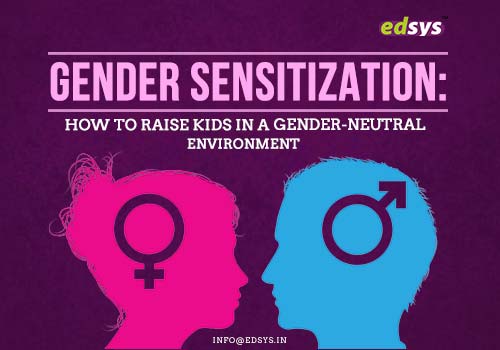Categories(658 Blogs)
Select Category
Watch Right Now
Teacher App - Class
Schedule & Attendance Management App
Parent App from Edsys

Best School Bus Tracking System

Cashless School - For Smart Schools of Tomorrow


Gender Sensitization: How to Raise Kids in a Gender-Neutral Environment

The importance of Gender Sensitization is raising high as every newborn is characterized by gender before stepping into this world. And, based on gender, everyone is labeled to have a particular set of prejudiced qualities. This taboo is present in so many countries, even in the U.S.
For kids, this can be a lifetime trauma if they are not able to cope with the harassment and preconception that others in society lay upon them.
Fortunately, parents are aware of this crisis, which is why they practice gender sensitization to change the way their sons and daughters are bred from the start.
They want their children to develop values that are not biased by gender bigotries.
But, how will a busy parent try to balance the beliefs of his/her child to ensure that he/she is protected from a gender-biased society?
If you want your child to be a part of a future that does not promote gender stereotypes, then you ought to learn and follow these tips.
1) Reduce the significance of a gender
Parents should make sure to free their children from the gender norms imposed upon them. Kids often grasp what their parents and people around them say while interacting.
Also Read: Sex Education For Teenagers: Everything you need to know
That is why your wording around a child is important every step of the way. Stereotyping children based on their gender is not prudent.
How many times have adults commented on a girl based on her physical appearance before other qualities?
In place of acknowledging them as “smart girl,” a better quote would be to say “smart kid.”
2) Discuss Sexism and Gender Stereotypes with your Child
One of the best ways to encourage gender sensitization is by communicating directly with the child on the issues of gender inequalities.
Parents need to teach their kids about stereotypes and sexism. Children need to understand such taboos whenever possible so that they know how sexism structures the world that we reside in.
Such conversations will impact children more if starting from the beginning of their learning age. That is how it will be apparent to them that the world is based on a stereotypical culture and not on inherent individualism.
3) Let Toys be Toys
Researches show that boys and girls show preference to play with toys that are provided to them based on their gender when they are around nine months old.
This behavior in them is likely stimulated in them because parents reward and initiate stereotypical playthings based on their biology.
The type of toys you are offering your kid is crucial for developing them. A toy is enough to shape their psychological and physical development.
Using a specific set of toys can lead to structuring their career interests and cognitive abilities too.
With toys, children learn skills. Board and block games teach them spatial skills and counting, while dolls let them understand how to nurture.
By just labeling ‘girl toys’ and ‘boy toys,’ we are making them develop limited skills to judge society.
Instead, parents should focus on encouraging a diversity of play for their children – and that too, without labeling the toys based on gender specifications.
4) Educate your Child about the “Blue and Pink” Color Stereotype
You must have seen many parents trying to decorate their baby’s room based on their gender.
Pink and blue colors are primarily considered to characterize such matters. As kids grow and witness a gender-specific color representation enforced upon them by their parents, they tend to accept it without questioning the norms of society.
Biasing a child’s brain about such shades only decreases their way to experience the world with equality. Don’t let your kid fall into that trap. Instead, open their world to enjoy all types of hues equally.
5) Encourage girls and boys to play together
It is essential to ensure that both genders can feel comfortable around one another while playing.
It is also vital to make sure that they work together with each other – at school, at the workplace, or in later stages of life.
Let kids learn to respect each other without making them feel awkward in a group that they think is not specific to their gender.
6) Make Them Comfortable about How They Feel
Children often feel that their liking of a specific habit might make them an outcast in society. But, as a parent, you must make them feel comfortable about their choices in life.
Let them know that it is fine to be different. Encourage them to believe that people can be females and males in their distinct ways, and there is nothing wrong with that.
7) Target your Kid as a Human Being
Studies show that humans, despite their gender differences, have a mix of characteristics from both genders.
Our physical structure might vary, but the mindset is mostly comprised of the thoughts nurtured into us from the beginning of our learning stage in life.
As a parent, you need to teach your child about gender equality without distinguishing genders.
Also Read: 9 Union Territories of India and their Capitals
Children need to understand that males and females participate equally to shape and nurture this world together. Educating them from the start will help them see life from a positive angle.
Final Words
No doubt gender biasing in the society is like a viral infection that will take a lot of time to fix.
Gender sensitization comes with beliefs to improve the social, and every parent will need to be a part of this revolution so that our future generation lives without stereotypical boundaries.
Don’t let your child fall into the hazardous trap of gender bias. Make them understand that it is not right to divide people based on genders with the help of the above tips.
Recent Blogs
Our Educational Services
Popular Blogs
Subscribe

SUBSCRIBE TO OUR NEWSLETTER
Sign Up and Recieve the Latest News
Don’t Worry, We Don’t SpamExplore Our Extensive Researched Educational App Directory
Visit Now
















